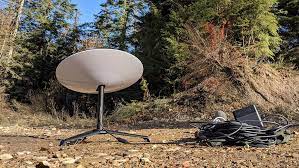Zambia became the sixth nation in Africa to receive SpaceX’s Starlink high-speed, uncapped satellite internet service after the company officially inaugurated its Starlink satellite internet service in the country.
Residents are now able to place orders for their Starlink kits immediately on the corporation website.
Internet connection is provided to people all over the world by Starlink through the utilization of a constellation that consists of thousands of satellites in low Earth orbit. The service is especially well-suited for use in rural and underserved areas, which sometimes lack the standard internet infrastructure needed to support modern websites.
The telecom is currently only available in select locations of Zambia; however, the business has plans to significantly increase the country’s coverage in the following weeks. The cost of the service is ZMW771 ($37) a month, and there is an additional one-time cost of ZMW10,744 ($505) for the hardware.
Users who intend to make use of the Starlink service in countries located elsewhere in Africa will be required to pay a monthly fee of ZMW1,000 ($47), which is the cost of regional roaming. Those who wish to bring their Starlink kit with them to another continent and utilize it there are required to pay a fee of ZMW3,950 ($186).
In addition to the normal Starlink dish, SpaceX also provides a Flat, High-Performance dish. This dish is aimed at professional and corporate consumers who have more stringent criteria for their broadband service. The Flat High-Performance dish may be purchased for a price of ZMW50,133, which is equivalent to $2,355.
Read also: Zimbabwe confirms Starlink’s license application
The usage of Starlink in Zambia
The introduction of Starlink in Zambia represents an important step forward in the improvement of the internet infrastructure in that nation. Only 44% of people in Zambia have access to the internet, and the World Bank reports that those who do have access to the internet generally face exorbitant charges and sluggish connections.
Starlink has the potential to help close the digital divide in Zambia by offering high-speed internet access to millions of residents for the very first time.
In addition to the advantages it provides for customers, the telecom may also have a beneficial effect on the economy of Zambia. This is because the service may entice new companies and investments in the nation, in addition to generating employment opportunities in the field of telecommunications.
SpaceX is in the process of spreading its satellite internet service across Africa, and the launch of Starlink in Zambia is a part of this larger trend. Nigeria, Kenya, Mozambique, Rwanda, and Malawi all became part of the Starlink network in the year 2023. Before the end of the year, it is also expected to be operational in the countries of Angola and Eswatini.
Musk halts Ukrainian-Russia attacks, prevents Starlink usage
Regulation of Starlink in Africa
In January 2023, when Elon Musk’s Starlink made its debut in Nigeria, the next-generation satellite internet service provider made good on its promise to usher in a new era of high-speed internet connectivity in the country with the most people on the African continent. In regions where internet service is either unreliable or nonexistent, it was also promised that low-latency internet would be provided.
At the time, the telecom’s operations have expanded into a number of additional African countries, such as Mozambique, Rwanda, Mauritius, and Sierra Leone. Launches in 19 further African countries are planned for the years 2023 and 2024.
On the other hand, the company’s operations in Africa have not been without problems due to legislative obstacles on the continent. Africa has a population of over 1.3 billion people, but only 40% of them have access to the internet, which is the lowest percentage in the world.
The importation of Starlink kits was deemed illegal in South Africa on August 14, 2023. South Africa’s telecoms regulator has issued a demand to a local Internet Service Provider (ISP), instructing them to stop acquiring, distributing, and enabling the sale of any Starlink products in South Africa. These devices would in any way allow satellite access to Starlink services. Specifically, the regulator wants the ISP to stop obtaining Starlink products in South Africa.
The Electronic Communications Act (ECA) has criteria that must be met in order for the ban to remain in place.
Those that offer the telecom within the borders of Senegal are coming under increased scrutiny from the government there due to their “illegal provision of internet access and irregular marketing.” The government has blocked access to the internet for the third time in less than a year, and this week’s crackdown comes just one week after that.
On August 7th, the government of Senegal made five arrests of people who were selling Starlink terminals without the necessary license or authorisation. The five individuals who were apprehended by the Department of Urban Security of the National Police face a possible maximum sentence of five years in jail and a fine of sixty million CFA ($100,000).
In addition, the authority that regulates telecommunications issued a notice to any service providers marketing Starlink, as well as any other company with actions comparable to those of the telecom, instructing them to immediately suspend all service throughout the nation.




